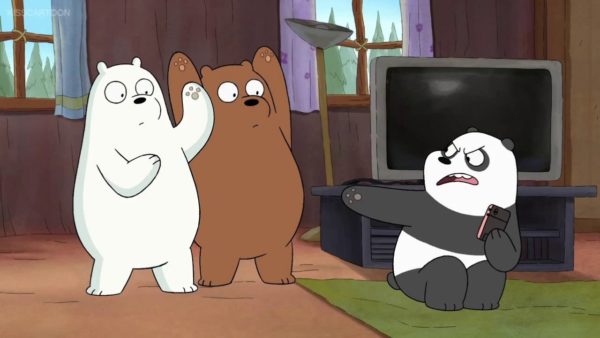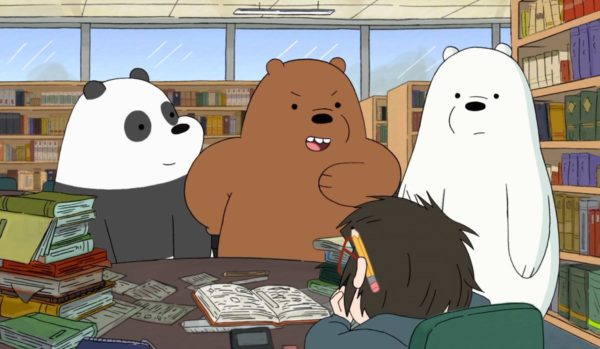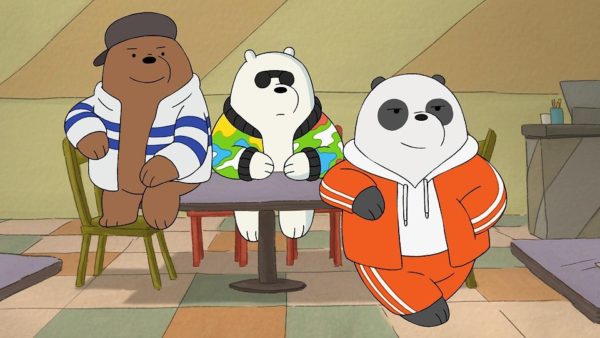
In “$100,” a friend that often visits the young bears’ home dons a ski mask and tries to rob them of their new-found $100 bill. In “The Road,” the bears share their box-home with a hitchhiker, only for the hitchhiker to steal their box the following morning. In “The Fair,” a loser carny exploits the bears’ cuteness to earn more customers to his rigged game. In “Pet Shop,” after failing to attract potential owners, the pet store cashier boxes up the bears and puts them in the trash. In “The Island,” a potential island friendship is ruined when we learn the dude has been gaslighting and manipulating the living fuck out of the woman also stuck on said island. These episodes involve the bears as young, even cuter versions of themselves as hapless, adorable, orphan wanderers, and perhaps the show finds amusement in their constant struggles. But, damn, those struggles really come off vicious and bleak, a pretty cynically dark take on humanity.
The episodes that focus on the bears as adults aren’t much more optimistic. The last new episode that aired on Friday, August 11, (“Summer Love”) contained a scene in which Panda was forced to pay a bribe to some bubble tea cashier to get information on a girl that left her phone behind. Later in the episode, he runs into trouble with some guy who goes crazy when a girl he liked became an astronaut. (The portrayal of dudes being obsessed over women, which includes Panda here, is an issue all on its own.) There’s an episode where the bears go to a crowded beach but for some reason every human there is some form of shit stain – a litterer, a loud music player, some woman who brought ribs (“Private Lake”). At the beginning of the show’s run, there was a chance that the show was attempting to channel that human behavior towards something specific, in their behavior towards the bears themselves, in treating them differently or aloof because they were bears (I weirdly got pushback for mentioning this, only for the very creator to more or less post a confirmation on Twitter). Basically, if you were to watch an episode of We Bare Bears with the thinking that, thematically, the show is about how subtly but clearly awful humanity is, you might be horrified by how distinctly the show believes this.
There’s the episodes with Nom-Nom, voiced by Patton Oswalt, who hates the bears and only cares about his social media following, and any moment that showcases a smidge of humanity from the cute koala is undercut; lessons are rarely learned. There’s Charlie, the show’s worst character, who’s pretty annoying by default and whom the bears only hang out with because they either feel sorry for him, or he has something they want (I find it remarkable that the show never realizes how insanely shallow this make the bears seem). Chloe is the only character that feels like she genuinely likes the bears, and whom the bears like in kind. Her early approach towards the bears, which was entirely academic and aloof, became something genuine, something shared between her and the bears. Both understood what it felt like to be outcasts, and their connections (and episodes) feel like the rare time the show exhibits some hope.

There’s a “but” coming, though.
Before that, though, I do think that episodes with Chloe suggest that We Bare Bears is not actively trying to be nihilistic. It’s a brightly colorful show with soft, cute character models by design, and it utilizes a light touch with a good amount of its narrative beats – its song cues and montages, its portrayals of its emotional moments, its honest depiction of its central brotherly bond. The issue is that, to get to the ultimate point of those latter two, it has to chart a streak of abject meanness and callousness in its world and its cast of characters. We Bare Bears hides its harshness well, and there’s a chance that it’s intentional; perhaps Daniel Chong finds humor in the contrasts of its characters’ awful, self-centered behavior and the lowkey, soft aesthetics of the show. But Chong isn’t Dan Harmon or Raphael Bob-Waksberg, or even a Ben Bocquelet. His show doesn’t seem to have a larger thematic point beyond that contrast. If he’s aiming to say that despite a hopeful sensibility about the world, the only people who can really trust are family, then… fine, I guess. It’s a bleak outlook for sure, but I don’t think he actually wants to say that, which is why We Bare Bears is a really muddled claptrap of a show.
Really, most episodes place the bears in a situation where each bear has to deal with some inane, contrived obstacle – a person being obtuse, a machine that fails to work, a thing in the way of progress. These episodes aren’t particularly funny or noteworthy, although Ice Bear’s blunt, contrite statements are good for solid laughs. Grizz’s heart tends to be in the right place but will most likely go overboard. Panda writhes between being hapless and pathetic, but he remains endearing enough so he rarely gets annoying. The bears’ problems are mostly situational, almost like bits in a sketch show, escalating problems that come together at the resolution. And that’s fine; at its best, the show’s escalation tinge with pastiches of a clear love of style, like Ice Bear’s vengeful mission in the very good “Icy Nights.” A sweet two-part episode called “Captain Craboo” also indicates a very clear understanding of the kind bittersweet storytelling that warms the cockles of one’s heart. See, also, “Yuri and the Bear,” a story in which Ice Bear and a tough Russian man named Yuri start as mismatched enemies but end up as friends.

But (there it is) there’s the sense that while Chong and his crew understand story structure, they don’t really have much stake in the characters and/or world that supports that story. Chong knows the proper beats to tug at the heartstrings, but fails to apply actual heart or meaning to anything outside that storytelling modus operandi. It’s all mechanical, which results in an assortment of characters who are one-note and dickish, until they aren’t, and that’s only when the story needs the emotional heel-turn. Outside of that, characters are mostly some form of asshole, indirectly or directly, masked behind millennial trappings like gourmet coffee, vegan food options, and excessive-to-obsessive mobile/social usage. (The show, to be fair, nails that modern sensibility but offers little to no exploration of why people are so engaged in those sensibilities, which makes them come off bubbled; Panda orders a fairly over-wrought drink (a gluten-free, chai-coconut milk boba tea) but I’m not sure if we’re supposed to laugh at that or understand it as a reflection of who Panda is.)
I look back at Daniel Chong’s tweet, and I look back at my own AVClub review, and I think about the show’s very early interest in maybe, sort of, exploring the uncomfortable treatment between the bears and the humans, in the very human world surrounding them. I think that, had the show kept that as an undercurrent, the sheer cynical approach to said humans (and to the bears) would have had context, something rich and consistent to better reflect Chong’s vision and thematic approach. We Bare Bears eventually dropped that human/bear tension (which I why I got shit for mentioning it in the pilot), but kept the broad sense of hostility, which results in a show that may understand story structure but has a deeply dim view towards humanity. Watching We Bare Bears is pleasant until its over; the aftermath leaves a weird taste in your mouth. That taste? A darkly negative view, underneath a tasty boba tea.
Comments are closed